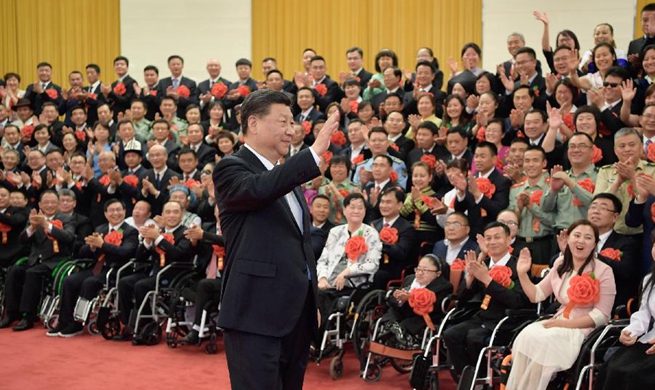HAVANA, May 17 (Xinhua) -- Cuba has implemented an ambitious plan to develop renewable energy sources until 2030, which allowed the island to save almost 33,000 tons of fuel last year and reduce carbon dioxide emissions.
With the aim of transforming its energy model by 2024, the Caribbean nation expects to generate 24 percent of its electricity through renewable sources like sugarcane biomass, solar panels, wind farms and small hydroelectric plants.
"Photovoltaic solar energy is the one with the most progress, and there are 65 parks built throughout the country and another 15 are in process that will increase the installed power to 42 megawatts (MW)," Tatiana Amaran Bogachova, general director of the Electricity Department at Cuba's Ministry of Energy and Mines, recently told national television.
The cost of production and maintenance of a kilowatt hour (KWh) in a photovoltaic park saves 95 percent concerning the energy generated in a regular thermoelectric plant, she said.
In 2018, the island produced 151,980 megawatt-hours (MWh), and saved 32,873 tons of diesel, the official said.
"Currently photovoltaic solar generation contributes 1.15 percent of the country's total consumption and this year it is expected that 52,199 tons of fuel will be saved," she added.
Meanwhile, Ovel Concepcion, director of renewable sources at the island's Electric Union, said among the main challenges in the sector are installing about 700 MW in solar panel parks until 2030.
"We will also set up some 688 MW in wind farms, 56 MW in hydroelectric plants and provide electricity through photovoltaic panels in all remote homes that have no access to any other source of energy," said Concepcion.
Currently, 17,536 solar panel systems have improved the quality of life in households that previously had no electricity, said Concepcion.
"Today there are four projects in different construction phases of solar energy parks with international investment for a total of 200 MW," he said. "One of them is the first park with 100 percent foreign capital located at the Mariel Special Development Zone."
Another renewable source is wind energy and today there are four parks built experimentally with an output of 11.5 MW, said Concepcion.
Currently, 13 new projects are being carried out in this area, three of them with local investment, nine with foreign capital and another one is under review, which will add up to 688 MW and will represent an annual saving of 540,000 tons of fuel.
Concepcion highlighted the construction of the "La Herradura 1 and 2" wind farms in eastern Las Tunas province, which will have 54 turbines that feature Chinese technology.
When talking about hydropower or water energy, he said "currently there are 147 hydroelectric facilities with a total capacity of 68 MW and the policy until 2030 is to increase the construction of new hydroelectric plants."
Also, sugarcane biomass obtained from the plant's bagasse will represent more than half of the electric generation with renewable sources in 2024 with the construction of bioelectric plants that will process the product.
Meanwhile, Barbara Hernandez, head of power generation at the state-run sugar producer Azcuba, said the electricity generation blocks of sugar factories are being gradually replaced with modern ones that use biomass as fuel.
"The electrical surplus after the sugar manufacturing process will be sold to the Electric Union for the nation's energy system," she said. "It's a way to recover the investments of bioelectric plants and use this model once the harvest is over."
The country's first bioelectric plant is being built in central Ciego de Avila province, about 450 km east of Havana, with a joint investment between the island and companies from China and Britain.
"This plant will generate around 157 KWh for each ton of sugar cane processed by the adjacent Ciro Redondo sugar mill. It's now at 41 percent of its construction plan with the aim of starting operations by the end of the year," said Francisco Lleo Martin, general director of Zerus, a Cuban holding company for foreign investment in the sugar sector.
The government policy for the development of renewable energies and energy efficiency in Cuba was approved in June 2014. Since then, intense work has been done to increase clean energies in the country's electricity generation.













